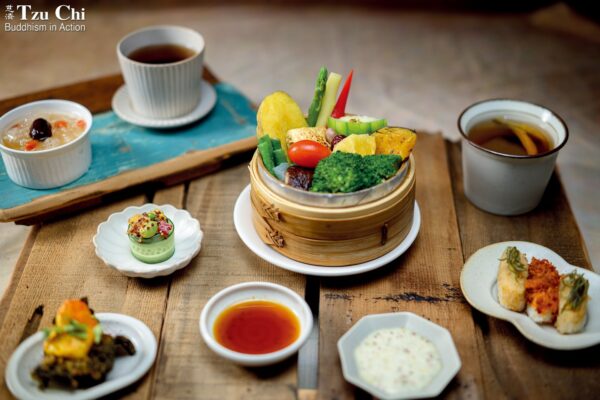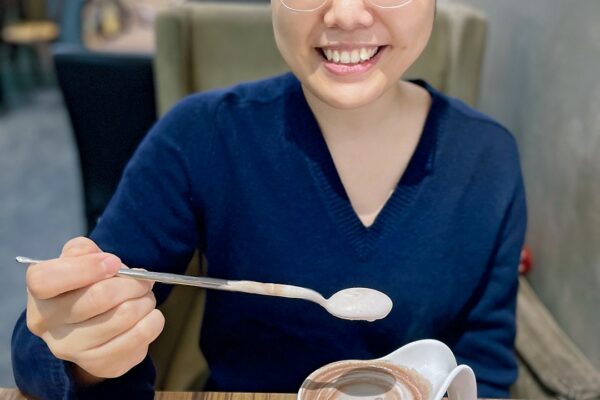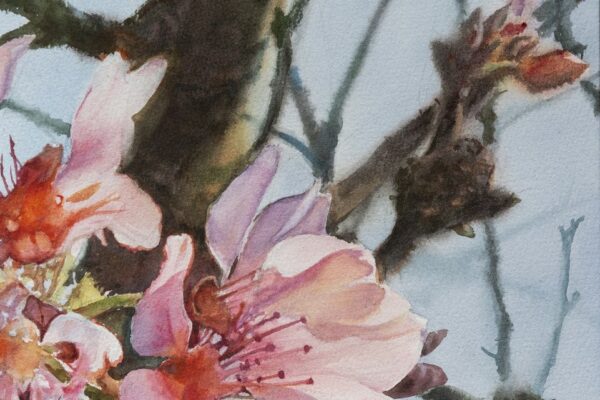By Yeh Tzu-hao
Translated by Wu Hsiao-ting
Photos by Alberto Buzzola
For every hundred Ukrainian refugees currently staying in Poland, two to three have received help from Tzu Chi. As the Russia-Ukraine war drags on, the foundation has launched mid- and long-term aid to further assist people displaced by the war.
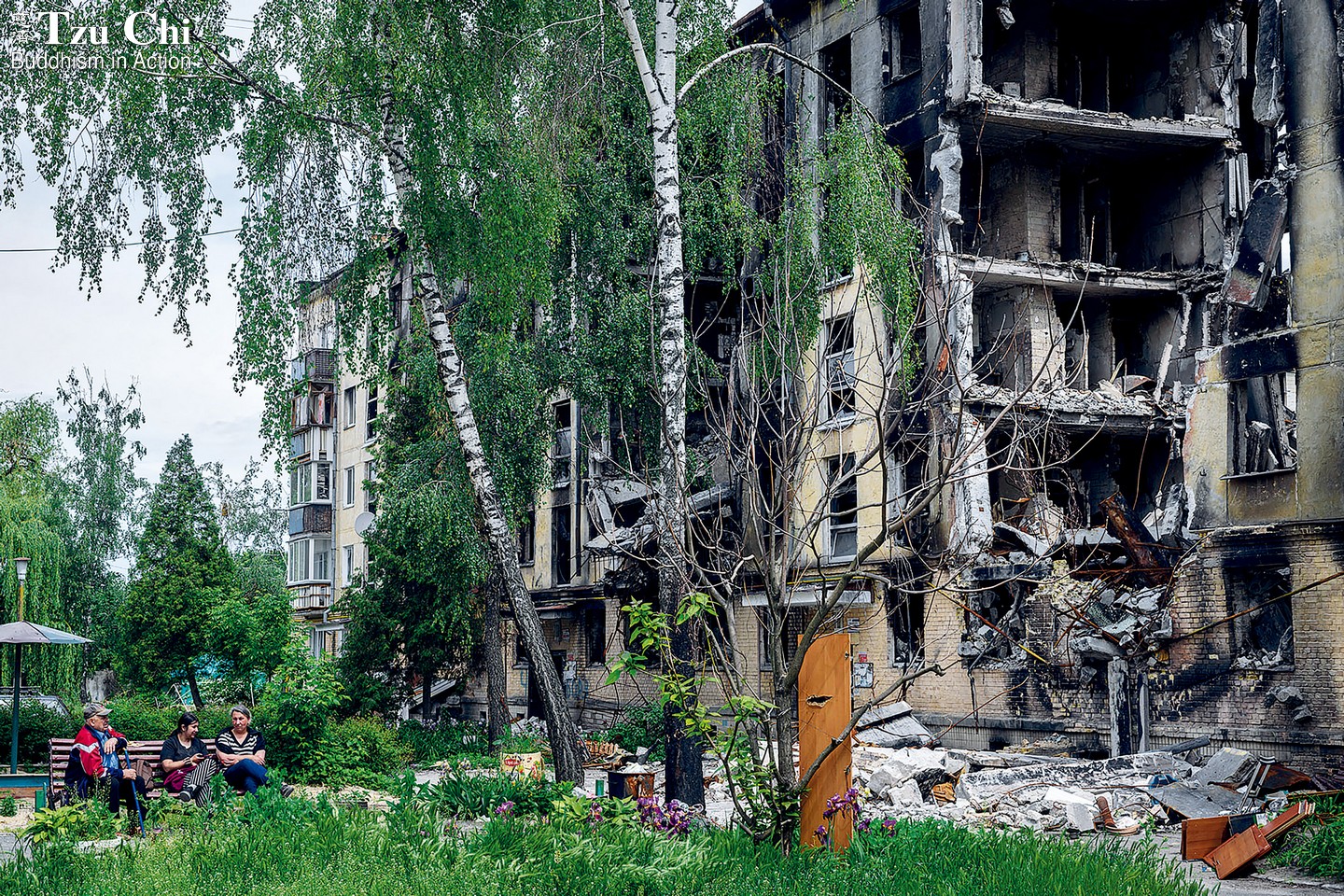
Ukrainians remaining in their home country after the Russian invasion in February 2022 strive to get on with their lives under the threat of warfare.
As the Russia-Ukraine war enters its first winter, the two sides that have been embroiled in fierce battles for more than nine months now face a new challenge—the severe coldness of winter. Once winter sets in, the East European Plain, on which European Russia and Ukraine are located, will be assailed by ruthless winds and snow.
“We generally use electricity or natural gas for heating; some also burn wood,” said Denys Dubin, a student from Ukraine currently studying at Tzu Chi University, in Hualien, eastern Taiwan. He pointed out that the war had exposed those relying on electricity or gas for heating to high risks. “You never know when a missile might fly over. If the electricity or heating facilities you depend on are bombed, you’ll have to bear the brunt of cold weather.”
Dubin’s concerns were not unfounded. Russia launched fierce attacks on electricity facilities in Ukraine in October, cutting off power or necessitating power rationing in the capital Kyiv and other areas. Heating systems were crippled without electricity or gas. Even if people have wood to burn, it will be difficult to get through the winter, given the damage to other infrastructure facilities and civilian houses.
The dangers of Russian attacks and the impending cold has caused the number of Ukrainians leaving their country to resurge. Łukasz Baranowski, a Polish Tzu Chi volunteer, indicates that an estimated 500,000 Ukrainians will cross the border into Poland before winter arrives.
However, Ukrainian refugees will continue to face many challenges and are not guaranteed an easy time, even if they can safely make it into Poland. The Russia-Ukraine war has dealt a hard blow to food and energy supplies, driving up prices. Polish citizens themselves are feeling the sharply increased pressure to get by, which is reducing the ability of Polish society as a whole to support the Ukrainian refugees in their country.
“The energy shortage problem has affected all of Europe,” said Monica Chang (張淑兒), the wife of Łukasz Baranowski and also a Tzu Chi volunteer. “Many private natural gas companies in Poland have responded by raising their prices, some as much as 500 percent. Some people have had no choice but to burn wood, which is also making air pollution worse.” Baranowski added: “Because of the war, Poland and other European countries can’t get enough natural gas. We predict that this winter will be a hard one, not just for the Ukrainian refugees, but for other Europeans as well.”
Aid on two fronts
Anticipating the challenges posed by winter, Tzu Chi sent out blankets and winter clothing to be delivered to internally displaced people in Ukraine. For this, the foundation partnered with Airlink, which transported the blankets and winter clothing to Poland free of charge. Then the items were given to Ukrainians returning to their home country, to bring into Ukraine. According to Debra Boudreaux (曾慈慧), CEO of Tzu Chi USA, Tzu Chi has also provided medications, entrusting them to IsraAID, a humanitarian non-governmental organization (NGO) based in Israel, for delivery via their logistics hubs in Moldova and Romania into Ukraine.
Tzu Chi has also continued to focus its aid for displaced Ukrainians within Poland, the country that has taken in the most Ukrainian refugees. According to statistics from the United Nations, there were still more than 1.4 million registered Ukrainian refugees in Poland in early November 2022. With the prospect of returning home still uncertain, the top issue facing them is how to support themselves in Poland.
Simon Shyong (熊士民), deputy CEO of the Tzu Chi charity mission, explained that Tzu Chi had given out enough aid by mid-November 2022 to help more than 80,000 Ukrainian refugees. The foundation’s next step will follow the example of how Tzu Chi Jordan and Tzu Chi Turkey have aided the Syrian refugees in their countries. Working with its partner organizations, the foundation will offer Polish language courses and vocational training courses to Ukrainian refugees in Polish cities such as Warsaw and Poznań. Such strategies will help the refugees find jobs in Poland and better assimilate into local society.
In fact, Tzu Chi has already achieved some results in helping Ukrainian refugees obtain work to support themselves. For example, Tzu Chi has implemented a work relief program, in conjunction with the Polish Women Can Foundation. One part of the program pays Ukrainian physicians who have escaped to Poland to provide their fellow compatriots with medical services, especially in the fields of family medicine and OB/GYN.
Tzu Chi has also been training and paying Ukrainian refugees to help the foundation conduct home visits and extend care to other displaced Ukrainians. During such home visits, the Ukrainian Tzu Chi helpers try to locate people who need assistance and then arrange for help accordingly. Gao Wei-li (高薇琍), of the Tzu Chi Department of Religious Affairs at the foundation’s headquarters in eastern Taiwan, explained: “In Warsaw, Tzu Chi and the Polish Women Can Foundation have together established an office. When our Ukrainian helpers find families who need our assistance during their home visits, they put them on a list to receive our care. Should any of these families require help with medical care or legal or psychological counseling, they are referred to the Polish Women Can Foundation for assistance.”
There are similar Tzu Chi helpers in Poznań conducting home visits for the foundation. They have found Ukrainian soldiers during their visits who have been sent to Poland after being maimed in the war. If need be, they list them as Tzu Chi care recipients too and give them aid, such as gift cards, to help them get by. “Such injured soldiers have been sent to Poland one way or another,” Debra Boudreaux said. “Some arrived as early as between March and May. Our Ukrainian helpers found them during their home visits, and we have since been doing what we can to help them.”
Besides finding people in need of aid via their home visits, Tzu Chi’s Ukrainian helpers also receive referrals from their fellow Ukrainians. Boudreaux observed that many Ukrainian refugees in Poland have formed group chats to keep in touch and help each other. When they learn about families that are having difficulty getting by, families whose children are looking for schools to attend, or that have members injured in the war and are looking for a hospital for treatment, they work together to find help or resources for the families. Tzu Chi’s Ukrainian helpers have become one of the sources the refugees turn to to seek help.
“We are hoping eventually to establish permanent Tzu Chi branch offices in Poland, with the help of our local helpers and volunteers as well as local ethnic Chinese people,” said Simon Shyong.
Most Ukrainian refugees are women, children, or older people, so Tzu Chi is placing emphasis on helping Ukrainian women settle in Poland and helping children obtain schooling and psychological counseling. In Taiwan, on the other hand, in addition to soliciting donations to help Ukrainian refugees, the foundation has spared no efforts in helping Ukrainian students attend Tzu Chi schools of higher learning.
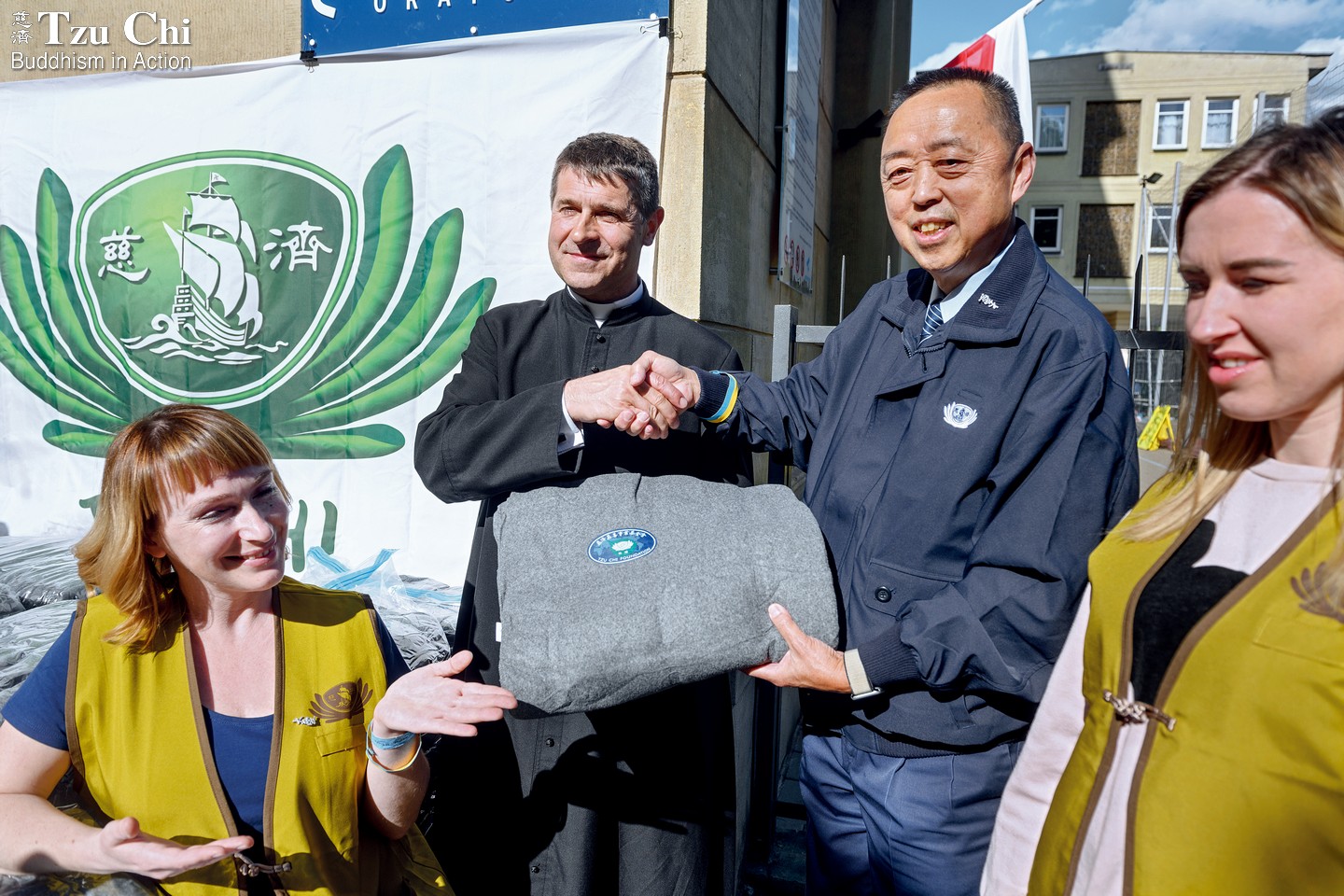
Tzu Chi volunteer Stephen Huang (黃思賢) thanks Father Sławomir Szczodrowski from a Salesian church in Warsaw for working with the foundation to distribute aid to Ukrainian refugees. Tzu Chi has implemented relief work for displaced Ukrainians in Poland in cooperation with several religious and non-governmental organizations.
Ukrainian students at Tzu Chi University
Hsinyi Hsiao (蕭心怡), Ph.D., Dean of International Affairs at Tzu Chi University, explained that in early March 2022, soon after the Ukrainian war broke out, Tzu Chi University announced that students from Ukraine were welcome to come study at the school. After the announcement was made, the Department of International Affairs at Academia Sinica, the foremost academic institution in Taiwan, forwarded nearly 200 letters of application to the university.
After intensive online interviews, Tzu Chi University decided to enroll 24 applicants. By early November, 23 of those students had begun studying at the school, ten studying for a degree and 13 that had come to learn the Chinese language. The university also invited six Ukrainian scholars to the school.
“The students study at our university, but they also take online Ukrainian courses at the same time,” said Dr. Hsiao. “They came to our school mainly for safety—they wanted to study in a secure environment where they would not have to worry about missile attacks.”
Speaking of these Ukrainian students, the dean sympathizes with them for what they’ve had to go through. She said that one student told her that after the war broke out, she had ridden in a train with fellow Ukrainians to escape from an area controlled by the Russian army. To prevent the Russians from discovering that the train was carrying people, the train windows were covered with adhesive tape to prevent light from spilling out. The entire trainload of people was transported this way out of the Russian-controlled area, with their hearts in their mouths, totally unaware of what was happening outside.
“There was also a Ukrainian student who, during her stay in a quarantine hotel when she first arrived in Taiwan, was scared whenever she heard an airplane flying overhead,” said Hsiao. “She was so scared she asked me online one time, ‘Is another war breaking out?’ I said to her, ‘No. Don’t worry. It’s just military planes on a drill.’”
Several of the Ukrainian students studying at Tzu Chi University have exhibited varying degrees of post-traumatic stress disorder. School administrators have arranged for psychological counseling, and even asked Tzu Chi volunteers who can speak English and who have counseling experience under their belts to serve as the students’ Tzu Chi moms and dads. (Tzu Chi moms and dads are Tzu Chi volunteers who “adopt” students of Tzu Chi schools and care for them as if they were their own children.)
Anna Mariia Chechina, one of the Ukrainian students at Tzu Chi University, said that the peaceful campus life at the university was exactly what she needed most after having fled from the war. She also expressed her appreciation for being able to visit Dharma Master Cheng Yen with other fellow Ukrainians before they started their lessons at the university. “The Master is an outstanding figure with the power to change lives. Her kindness and generosity moved me to tears.”
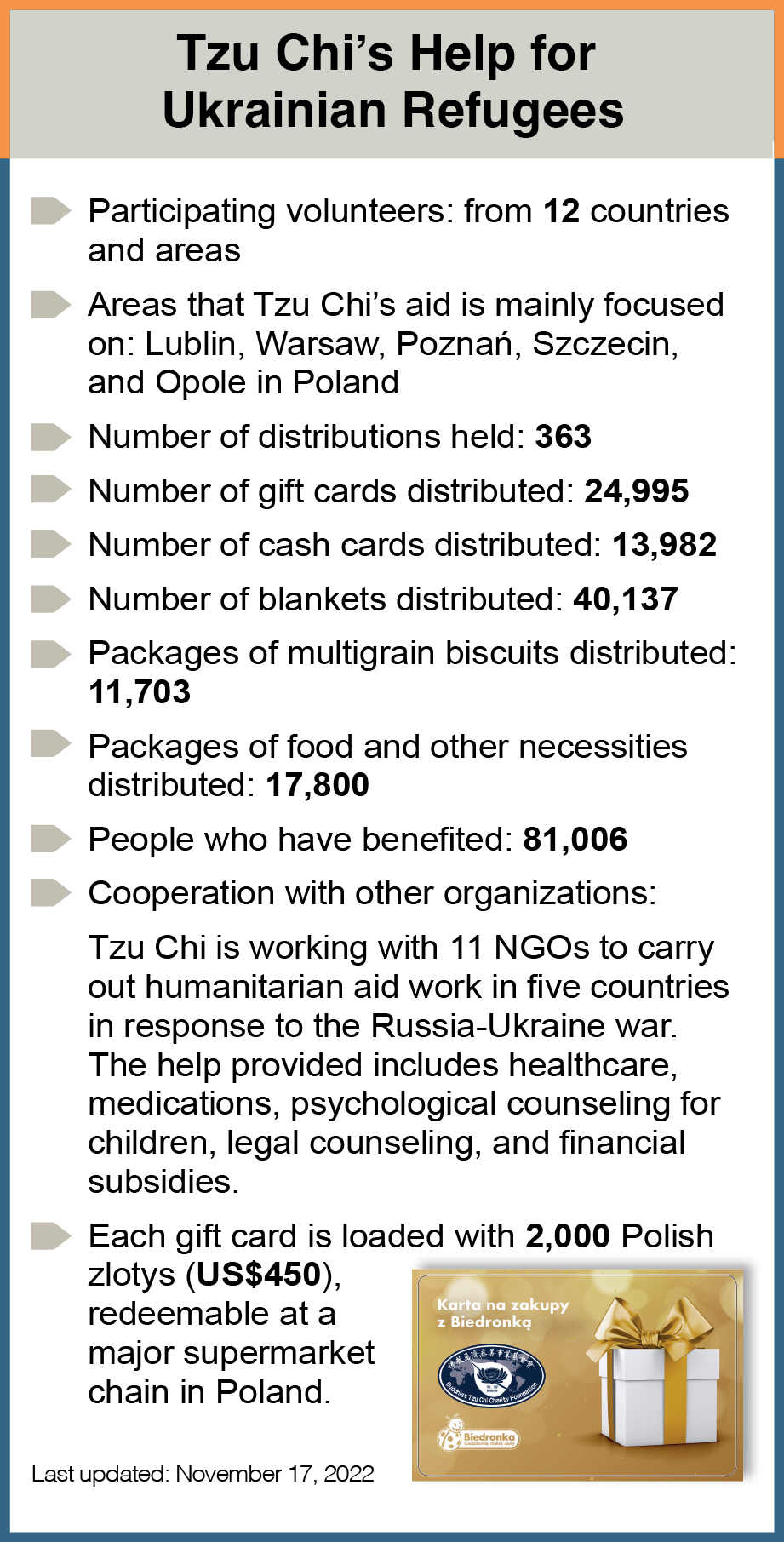
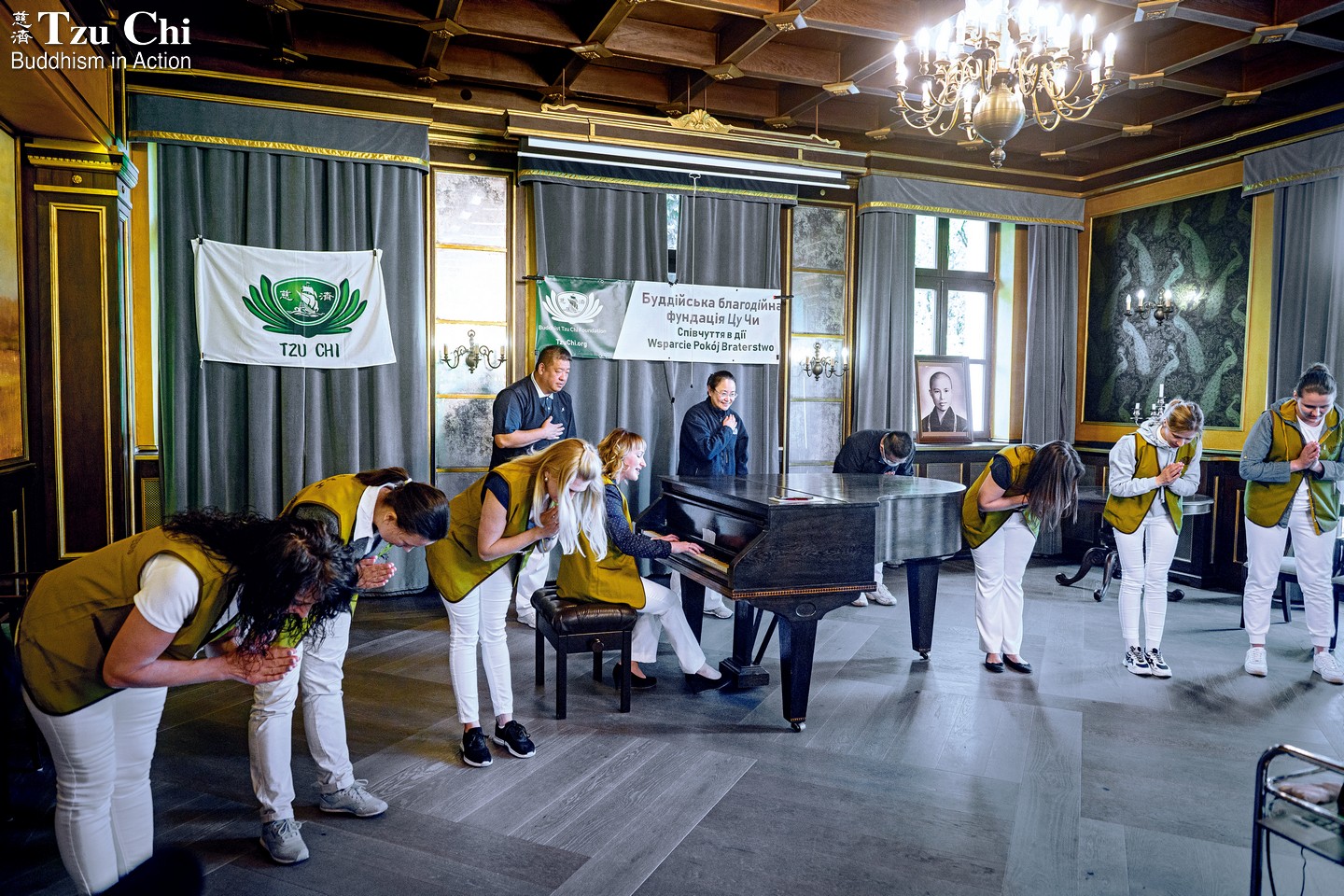
Tzu Chi volunteers perform the Tzu Chi song “One Family” at a distribution held for Ukrainian refugees in Warsaw.
Cycle of love
Since the war started, the international community, regardless of religion or ethnic background, has never stopped extending aid to Ukrainian refugees. Tzu Chi, as part of the international community, has being doing its part too. Whether it be via distributing relief supplies, providing language learning and vocational training courses, or offering work relief programs, Tzu Chi is hoping to soothe the wounds caused by the war and plant seeds of kindness in this difficult time.
When they are distributing relief goods and gift cards, volunteers make a point of sharing the origin of Tzu Chi with the aid recipients. They explain to the refugees how the foundation started with 30 housewives each saving a little money in a coin bank every day to aid the needy. They hope to convey to the refugees how small amounts of money pooled together can be used to do great good. The money on the gift cards distributed by Tzu Chi, for example, comes mostly from small donations of kind-hearted people around the world. No one should underestimate their power to make a difference.
“Tzu Chi is different from other NGOs,” said Chen Hui-ru (陳惠如), who lives in Opole, Poland, but is originally from Taiwan. “What impresses people the most during the foundation’s distributions is the sharing of Tzu Chi ideals and the use of coin banks to inspire people’s love.” Chen and her husband, Radosław Atlas, had contacted Tzu Chi on their own initiative after the foundation started holding distributions in Poland for Ukrainian refugees, and asked to work with the foundation to help the refugees in their city. This led Tzu Chi to launch distributions in Opole in June 2022. Because of this experience, Chen got to witness the impact of the “Tzu Chi coin bank spirit”: some Ukrainian refugees were so touched after hearing Tzu Chi volunteers share the story behind the coin banks that they volunteered to hold a coin bank during the distributions to solicit donations from their fellow compatriots.
“I didn’t get it originally,” said Chen. “I thought, ‘Aren’t the refugees here to receive help? Why are they being invited to deposit money into a coin bank?’ But when I saw how they smiled or were moved to tears because they had been able to contribute their bit to help other needy people, I got it.”
“Two to three out of every hundred Ukrainian refugees currently in Poland have received gift cards from Tzu Chi,” said Simon Shyong. He added that the gift cards or other material supplies that Tzu Chi volunteers have distributed will last the refugees for only so long, but the love and kindness inspired in their hearts will last forever. He hopes that with love inspiring love, those who Tzu Chi has aided will help the foundation provide further help in Ukraine in the future.
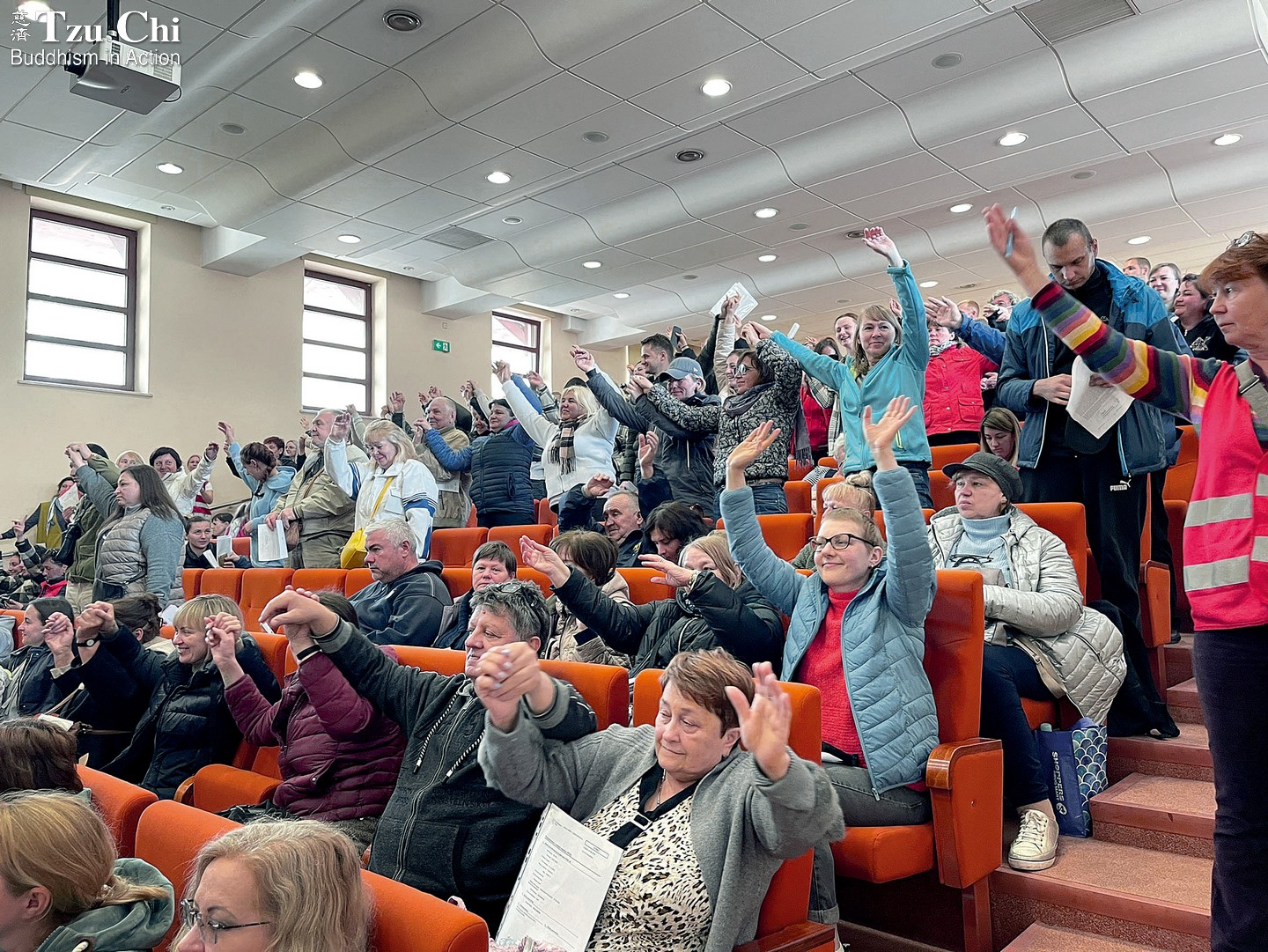
Ukrainian refugees participate in a group activity during a Tzu Chi distribution in Lublin.Susan Chen

